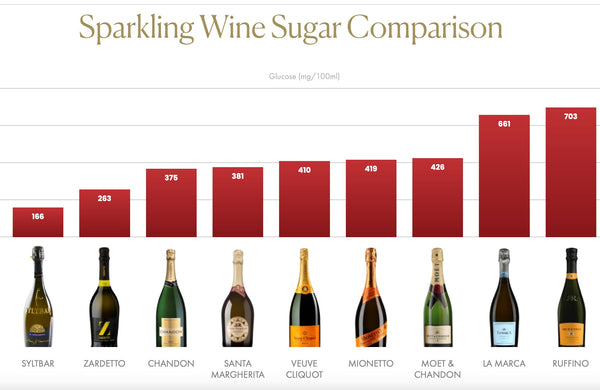When it comes to celebrations — even when simply celebrating the happiness of everyday life — few things match the effervescence and joy of toasting with a glass of Brut Prosecco. However, for those of us mindful of our carbohydrate intake, the question arises: How many carbs are hidden in those delightful bubbles? Let’s unveil the typical carb content in brut champagne and Prosecco. Discover the benefits of a low-carbohydrate lifestyle and why incorporating low-carb wine, like Prosecco, might be the perfect balance of health and indulgence.
Prosecco, with its crisp taste and lively fizz, has become a staple in many wine lover’s lives. But what about the carb content? On average, a standard glass of Prosecco or Champagne contains around 1-2 grams of carbohydrates per 5-ounce serving. The carbs mainly come from residual sugars present in the wine, contributing to its sweetness. Prosecco with higher residual sugar levels tends to have more carbs, and also more calories. Opt for those labeled as "Brut" or "Extra Brut” as these sparkling wines will contain lower residual sugar and, consequently, fewer carbs.

SYLTBAR is the perfect example of this. Our bottles are labeled “Brut” and have an extremely low amount of residual sugar left. This is due to the four-month secondary fermentation process that allows the grapes enough time to fully develop their natural flavor and their fruitiness — not sweetness. There is a very fine line, and big difference, between “fruity” and “sweet.” You may not be able to taste the different right away, but the next day your will body will certainly be able to tell the difference when you wake up feeling hung over because of the added sugar. There is no need to add extra sugars, and therefore the carb and calorie count is also very low. Mr Premium Prosecco is only 49 calories per 6 ounce serving, with 0.3g sugar/carbohydrates!
Understanding the carb content is crucial for those aiming to maintain a low-carb lifestyle without compromising on the enjoyment of their favorite sparkling wine.
Benefits of a Low-Carb Lifestyle:
- Weight Management: Lowering carb intake can aid in weight management by reducing overall calorie consumption and promoting fat utilization for energy.
- Increased Energy Levels: Minimizing carbs and focusing on nutrient-dense foods can lead to sustained energy levels throughout the day.
- Blood Sugar Control: For individuals with diabetes or those aiming for stable blood sugar levels, a low-carb lifestyle can be beneficial.
Speaking of blood sugar control, Mr and Mrs SYLTBAR have gone through extensive lab studies by the University of Miami Diabetes Research Institute that showed these two sparkling wines had no negative effect on the blood sugar levels of Diabetes patients, and were significantly lower in sugar content than many other well known brands on the market.

Incorporating low-carb wine, such as Prosecco, into your lifestyle allows for a guilt-free celebration — any time of day, any time of the year. That’s why we call it our Happy Healthy Daily Juice, after all. The key is moderation and mindfulness. Stay hydrated, maintain frequent exercise and adequate sleep habits, and pair your bubbly with lean proteins, fresh fruits, and vegetables to create a well-rounded, satisfying experience.
Prosecco enthusiasts can rejoice in the knowledge that their favorite sparkling wine can be part of a health-conscious lifestyle. Now that you understand the low-carb content of SYLTBAR, you can make informed choices that align with your wellness goals. Let’s raise a glass, savor the bubbles, and celebrate the harmony of health and indulgence with every sip of low-carb Prosecco! Cheers to a sparkling, balanced lifestyle.
Shop for low carb wine at syltbar.com or look for a local retailer near you that sells our wines.







